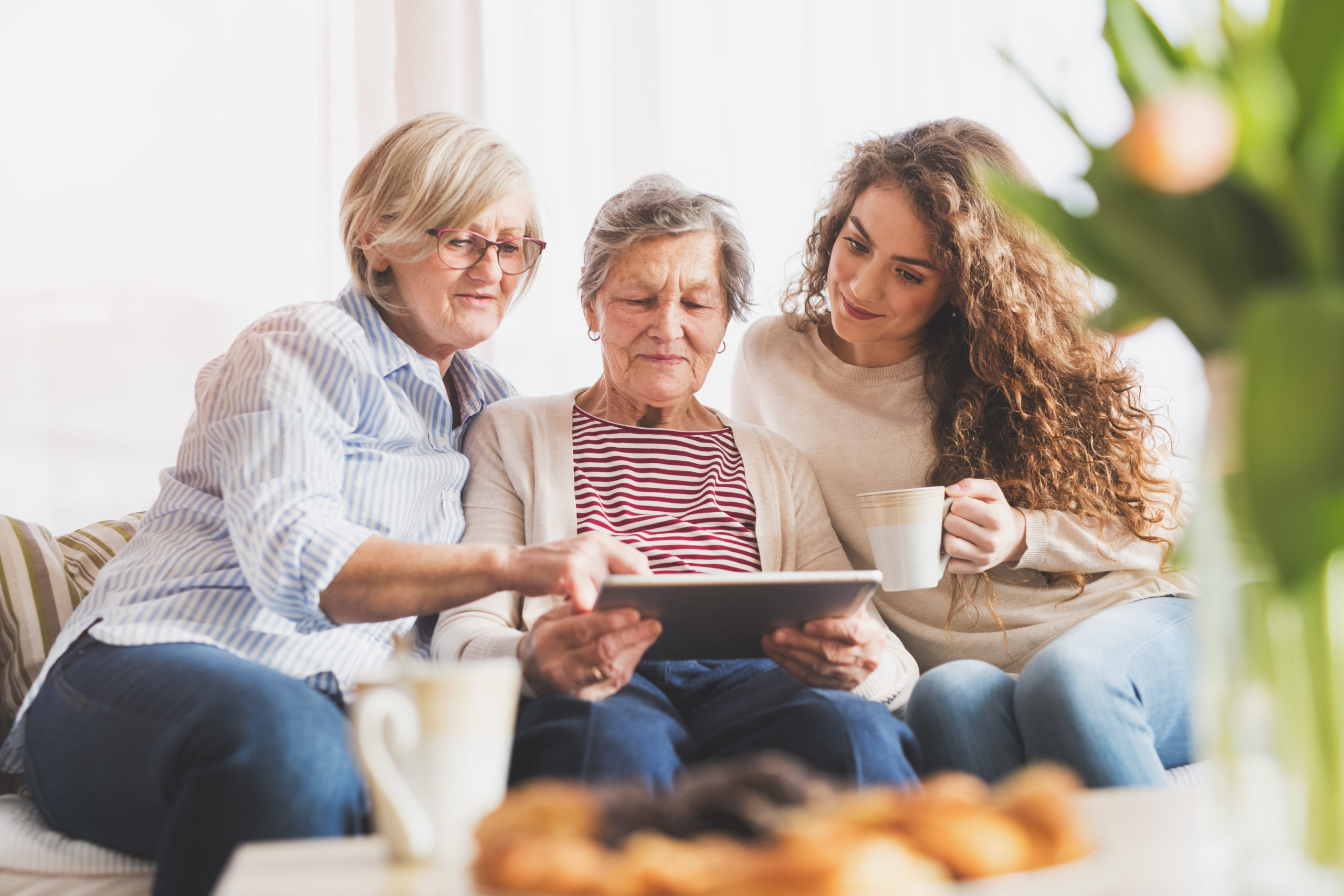The Sandwich Generation is Feeling the Pressure During COVID-19
Advice for coping with stress & anxiety during these challenging timesMore and more often, adults are finding themselves in the challenging position of having to raise their children while simultaneously caring for their elderly parents. This population has come to be known as the “sandwich generation,” bracketed by the responsibilities of caring for both groups. Whether under the same roof or through support from a distance, members of the sandwich generation face uniquely challenging circumstances.
Staggering Challenges in a Growing Generation
These circumstances have been exacerbated by the global COVID-19 pandemic. While all individuals and families are facing new challenges and realities, none have felt the impact quite so closely as the sandwich generation.
Audrey Bond, CEO of Vaultt, a company with a secure information platform to support families, knows all too well how difficult those challenges can be. Her mother is a paraplegic and her father has dementia; both are full-time dependents. She says as the population increases in age, so do the obstacles.
“We’re sandwiched between taking care of our children and our parents at the same time,” says Bond. “This generation is a significant part of North America’s population and it’s continuing to grow.”
The difficulties facing this growing population pre-COVID were already staggering. Schedules were packed to the brim with barely any breathing room; one day might include getting the kids to hockey practice after a day of appointments for elderly parents, with a few scant hours at the end of the day to catch up on any work that might’ve been missed. Health check ups, social calls, hobbies and emergencies for both sets of dependents already ate up hours in the day. Spending quality time with a partner can sometimes feel like a luxury when there are always dishes to clean or loads of laundry to do.
The financial burden was also a struggle. Care costs are high, especially for in-home care services or full-time residential care. It’s so high, in fact, that a quarter of all Canadian sandwich generation members reported that they expect to put their own financial goals on hold as a result of supporting their parents and their children at the same time.
In the United States, over three-quarters of care for the elderly is provided, for free, by family and friends. Long-term care insurance is often unaffordable for many. As a result, many caretakers wind up spending significant amounts of money or losing work and career opportunities.
“We all sign up to take care of our families,” says Kristine McGinn, CEO of Assurance Home Care, a boutique in-home care service that helps the elderly and their families manage the challenges they face. “This often means navigating new territories, because you’re required to wear many hats as the child of an elderly person. You need to be the financial manager all of a sudden, to be the safety patrols, watching out for tripping hazards and fall risks. To some degree, you’re expected to be a healthcare system expert.”
And this was day-to-day life BEFORE the pandemic hit.

Figuring Out the New Normal
Everyone has felt the impacts of the Coronavirus to various degrees. Many have had to adapt to new working conditions, varying schedules and different levels of productivity. Others have lost work entirely, relying on government and community support to make ends meet while searching for a new job. Parents must find ways to not only care for their children, but to ensure they continue to learn and meet important education milestones.
Healthcare impacts are one of the most immediate challenges. Shutdowns to healthcare facilities mean that many elderly are now waiting on non-emergency surgeries, which only amplifies existing care needs.
“There’s also the fact we’re not seeing our loved ones,” says McGinn. “If they’re in a retirement home or long-term care home, it’s been weeks that you haven’t seen these people; that not only increases stress and anxiety, but logistically, a lot can change in just a few weeks with elderly people.”
Even caring for family members at home is not without its own stresses, especially if those family members have acute care needs, such as dementia or Alzheimer’s. “Being in a single residence and generally together 24/7 for months, that really, really increases the stress,” says Bond.
Stresses aren’t limited to elderly parents. Where once homework challenges simply meant a night working together to solve problems before class the next day, in many cases parents now also have to act as tutors, ensuring their kids are learning and able to continue their education. “My daughter has ADHD, so she is a procrastinator. Her time management skills aren’t necessarily the best, and having to learn grade 11 chemistry and math on her own at home has definitely been a challenge,” says Bond.

Online Threats on the Rise
Cyberattacks and digital scams have also grown exponentially in relation to the pandemic and have increased stress on families and caregivers. Bond’s mother was targeted by a phishing attack but Bond was thankfully able to act quickly. The incident opened her eyes to just how difficult the lockdown has made even mundane tasks like helping family members with technology.
“It’s a new vulnerability to look at, one that I forgot about because she was in lockdown,” says Bond. “I was really looking after her health and her physical security, but I never thought about her computer. It was just something that slipped my mind. Because we’re still in lockdown, I can’t do anything about it at the moment. Her computer is her window to the outside world, and she’s very isolated now.”
The compound effects of the pandemic will certainly take a toll on mental health. In these unprecedented times, and with the deluge of scary headlines filling up every social media feed, it’s difficult to find those moments of peace and grace. Especially in a busy household.
The good news is that these challenges are not insurmountable. There are tools, techniques, and supports available to the sandwich generation to help them through the difficulties of life during the pandemic and beyond.

Coping, Caring, & Continuing
Like all aspects of life, the pandemic’s impacts on the sandwich generation were sudden and significant.
“At first, when the world shut down, ten percent of the population just closed the doors [to care homes] and said they were just too nervous to let anyone in,” says McGinn. “But then, slowly, as more people have learned about how the disease is spread and the measures that have been taken in terms of safety protocols and best practices, those doors have started to reopen.”
As the world has slowly come to grips with these difficulties, more and more families have started to develop their own strategies for overcoming the challenges they face and managing their stress and anxieties.
“We’re all finding our personal ways to survive this and not go backwards,” says Bond. While there is no single “correct” way to manage these challenges, common themes have become apparent.
Prioritize & Plan
All families have had to assess what their priorities are and how they can best address them in this time of upheaval. The sandwich generation is no different., If you’re living at home with your children and elderly parents, to-do lists and family planners can create some order from chaos.
“Staying organized is the only way that I have survived this,” says Bond. “I find that the more organized I am, the less stress I have.
McGinn is of a similar mind. “Just having information in one place is big,” she says. “People often carry things in their heads about their parents, so having one person or data sharing tool designated to manage everything, that’s a big help.”

Stay Informed
The 24-hour news cycle is a stressor in and of itself, but staying up-to-date and informed on limitations can help ease the pressure on your family. As some provinces and states begin to introduce the “two-family bubble” concept, or as gathering limits increase to a ten-person maximum, inviting family or friends over can provide a much-need mental health boost. Simultaneously, if the stress ever gets to be too much, take a break from the news.
Ask For Help & Set Boundaries
“The number one thing is to set boundaries for yourself,” says McGinn. “You’re not Superman. Although you might have been functioning reasonably and managing all these incoming things before COVID-19, you have to remember we’re in a whole new world.”
Setting limits are vital to avoiding burnout and exhaustion. Low-level anxiety and worries take a toll, no matter how good we might feel in the moment.
If you have full-time work on top of your care responsibilities, try to segment your day, preventing work concerns from bleeding into what should be your time for other tasks.
Having a network of support amongst siblings and extended family can also go a long way, but physical distancing remains a hurdle. You might consider scheduling regular family calls or social-distancing visits with your elderly family members to help maintain socialization and a sense of connectedness.
Home care services also offer families with some respite, ensuring family members get the medical support they need, assistance with groceries, or simply a friendly face to speak to when a visit isn’t possible with immediate family.
Putting Technology to Work
Leveraging tools and technology have become common threads for many facing challenges in this pandemic, especially as families try to share information between themselves.
“There’s definitely an information burden and a care burden,” says Bond. “If [a family] has multiple siblings, quite often that burden falls on one sibling.”
As families move across the country, if not the world, simply sharing information about care becomes a lot more challenging. “It’s such a challenge just to keep in touch and keep people up to date,” says Bond. “Who’s got time to be constantly calling people? Do you call everybody? Do you have conference calls?”
Bond gives the example of taking a parent to an appointment and trying to remember all the details to share with a family member later. With overloaded schedules and constant stress, it’s easy for things to slip by, even for the most diligent caretakers.
What’s more, emergencies or changes in care can also have legal or financial implications. Knowing who has power of attorney and having documented information on a family member’s will can help alleviate significant stress in times of crisis.
“Where do you keep information, and how are you keeping connected?” asks Bond.
More and more often, people are turning to technology solutions such as Vaultt to ensure they can quickly share vital information about their elderly parents with each other and with caregivers, helping them more easily manage the issues they face.

Go Easy on Yourself
“I have to give myself grace, because as much as I’d like to be able to do it all, I can’t. It’s impossible,” says Bond. “There’s a lot of pressure on social media – you see people learning new instruments, their houses are completely organized, they’ve learned a new language, or have mastered meditation, and they’re in the best shape of their lives.”
The pressure to live up to this standard can be overwhelming in its own right. “Not everybody can conform to that, nobody can live up to that,” adds Bond.
You are trying to do five jobs at once. In those moments, remember that you are human. You have limits. You can only do so much. The challenges you are facing would be difficult for anyone. Perfection is the enemy of progress. Find those moments to give yourself time away from these stressors, and understand that what you are doing is enough.
As difficult as the situation can be, remember that you are not alone. As challenging as the pandemic is for the sandwich generation, seeing the way communities have come together to support those in need provides some measure of hope.
While these coping techniques may not solve the problems facing your family outright, they can help you manage things one day at a time.
